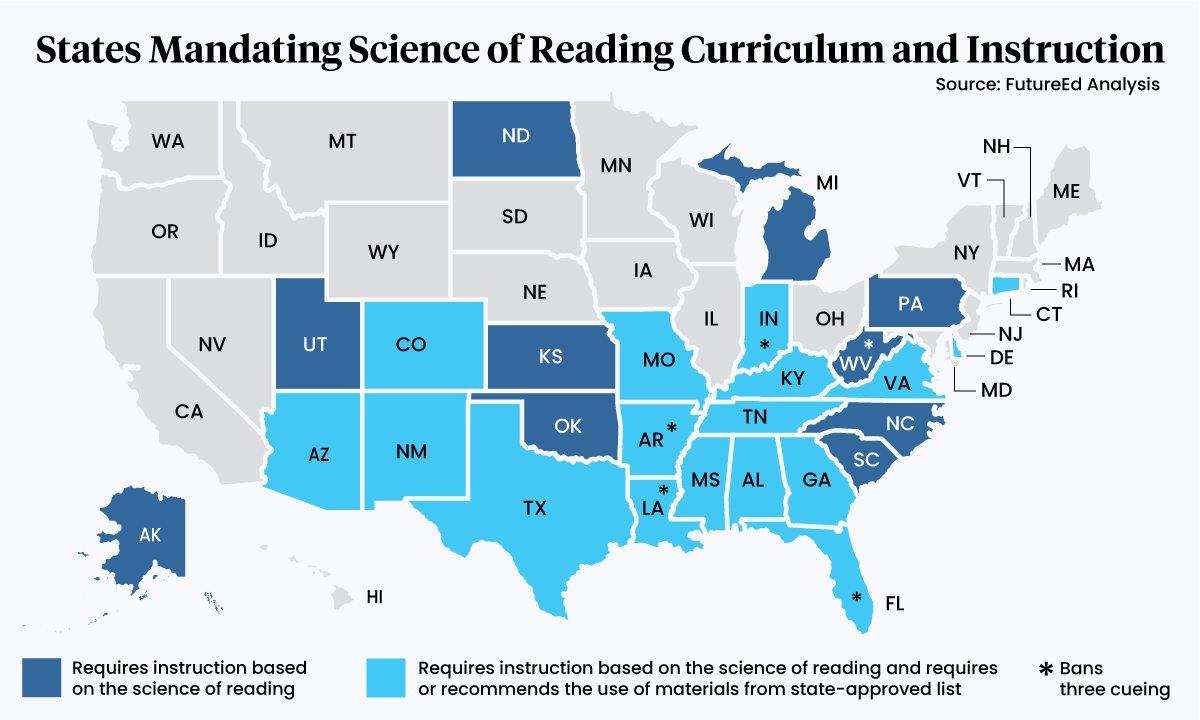New Report Highlights States that Are at the Vanguard of the Reading Revolution
Olson: TN, MS and other states have enacted laws that spurred redesigned literacy instruction and raised student achievement in thousands of schools.

Get stories like this delivered straight to your inbox. Sign up for The 74 Newsletter
In the past five years, 30 states around the country, with leaders from both political parties, have passed laws requiring educators to teach young children how to read based on what educators now know from science about effective literacy instruction. These laws are an important advance and address an urgent need: The most recent scores from the National Assessment of Educational Progress found that only a third of fourth graders are proficient readers, significantly fewer than before the pandemic.
Yet passing state legislation is only the first step. The challenge now is to translate these policies into effective classroom practices, expanding instruction based on the science of reading in the nation’s vast, decentralized system of more than 13,000 school districts. A new FutureEd report, The Reading Revolution: How States Are Scaling Literacy Reform, tells the story of how Mississippi, Tennessee and other states at the vanguard of the reading revolution have redesigned reading instruction and raised student achievement in thousands of public schools through bold, state-level leadership.
These states have addressed every aspect of early literacy, from how teachers and prospective teachers are trained to the curriculum they use, how students are assessed and whether children are retained rather than promoted to the next grade. Taken together, their experiences offer a blueprint for how other states can successfully move from legislation to actual shifts in instruction and student outcomes.
First, states such as Mississippi and Tennessee, recognized that they needed a multi-year strategy, rather than a piecemeal approach, to changing literacy instruction. This included aligning everything from teacher licensure requirements to instructional materials to interventions for struggling students to the science of reading.
Second, they invested in initial statewide training for educators, followed by ongoing support as teachers applied what they learned in their classrooms. The Mississippi Department of Education selects and trains literacy coaches and assigns them to targeted schools, where they work with teachers on early reading instruction and do “Literacy Learning Walks” through classrooms with school administrators to observe lessons and provide feedback. The Tennessee Department of Education created regional networks of districts to engage in monthly classroom walkthroughs and to share best practices, including coaching on how to give teachers feedback. The state’s Best for All website also posts videos of teachers’ early literacy practices, so that they can learn from one another.
Third, Mississippi and Tennessee ensure that teachers and students get high-quality instructional tools grounded in the science of reading. Tennessee adopted a list of high-quality English language arts materials in 2020 and requires districts to choose from among them when devising an early literacy plan, which must be submitted for state approval. The state also developed a free, optional Tennessee Foundational Skills Curriculum for pre-kindergarten through grade two. Mississippi adopted a recommended list of high-quality ELA materials in 2021.
Fourth, states like Mississippi and Tennessee use classroom observations and rubrics to determine how well teachers are implementing the new reading strategies, so district and state officials can identify areas for improvement, or areas where teachers might need additional training or more resources.
Fifth, to identify children who need extra help, these states screen early elementary students three times a year, looking specifically for dyslexia or other potential reading difficulties. In 31 states, parents must be notified if their child has reading difficulties. Ten states require families to be involved in developing an individual reading plan for their child. In Louisiana, for example, within 30 days of being identified as having below-grade-level literacy skills, students must have an individual reading improvement plan created by the teacher, principal, other pertinent school personnel, and the parent or legal guardian.
Sixth, struggling students are provided with interventions aligned to the curriculum used during core instruction, so that what they learn during tutoring, summer programs or before- and after-school programs connects with what happens in their classroom. Tennessee, for example, ensures that all tutors hired through TN All Corps are trained in the science of reading and provides them with a foundational literacy skills curriculum for grades 1 to 3. States’ primary focus should be on preventing students from failing reading in third grade rather than retaining those who are not successful. Students who are retained should receive individualized, evidence-based supports, not just more of the same.
Seventh, states can use their regulatory authority to prod teacher preparation programs to align with the science of reading, as Tennessee, Colorado, and Mississippi have done. Teacher candidates should demonstrate that they understand the science of reading, how to teach reading and how to select and use high-quality English language arts materials.
Finally, states need dedicated funding to build and sustain the infrastructure needed to support the science of reading, because these changes will not happen overnight.
For decades, teachers, through no fault of their own, were handed a faulty playbook about how to teach young children to read. Turning those practices around will require intentional and sustained action on the part of states. But the experience of early state leaders shows that it can be done.
Get stories like these delivered straight to your inbox. Sign up for The 74 Newsletter

;)
